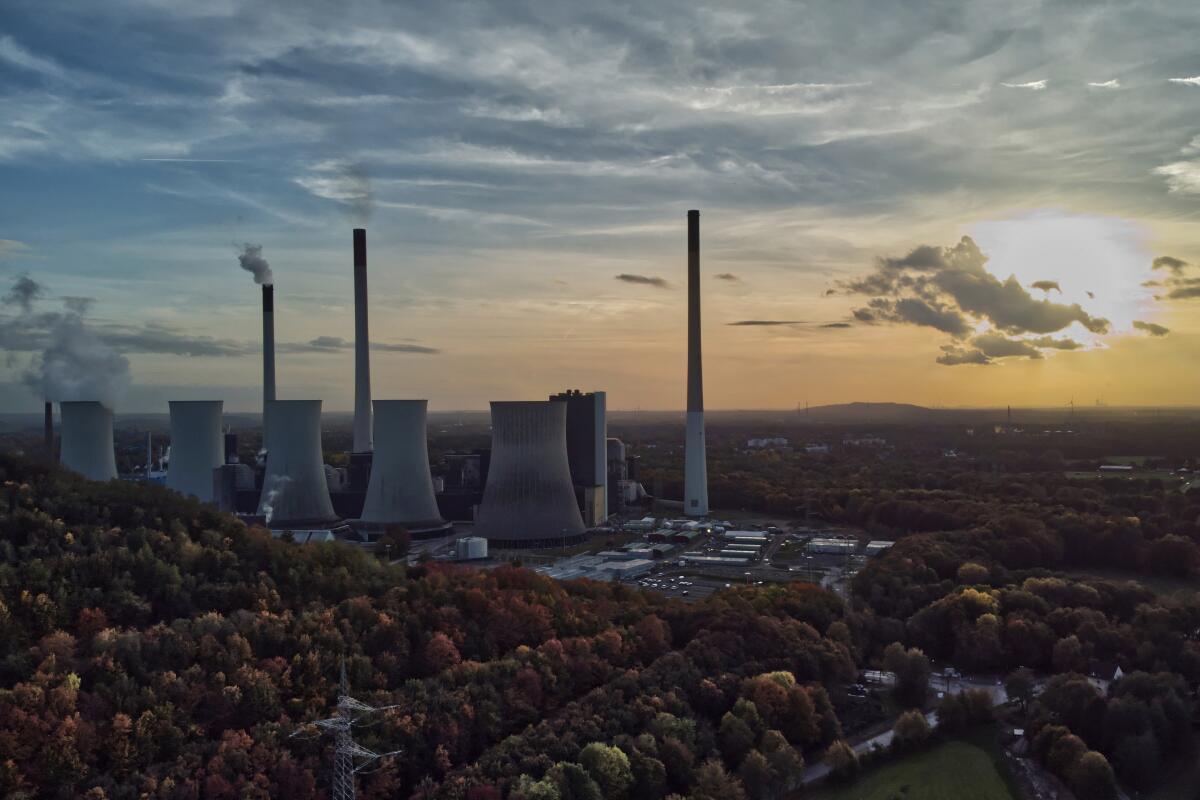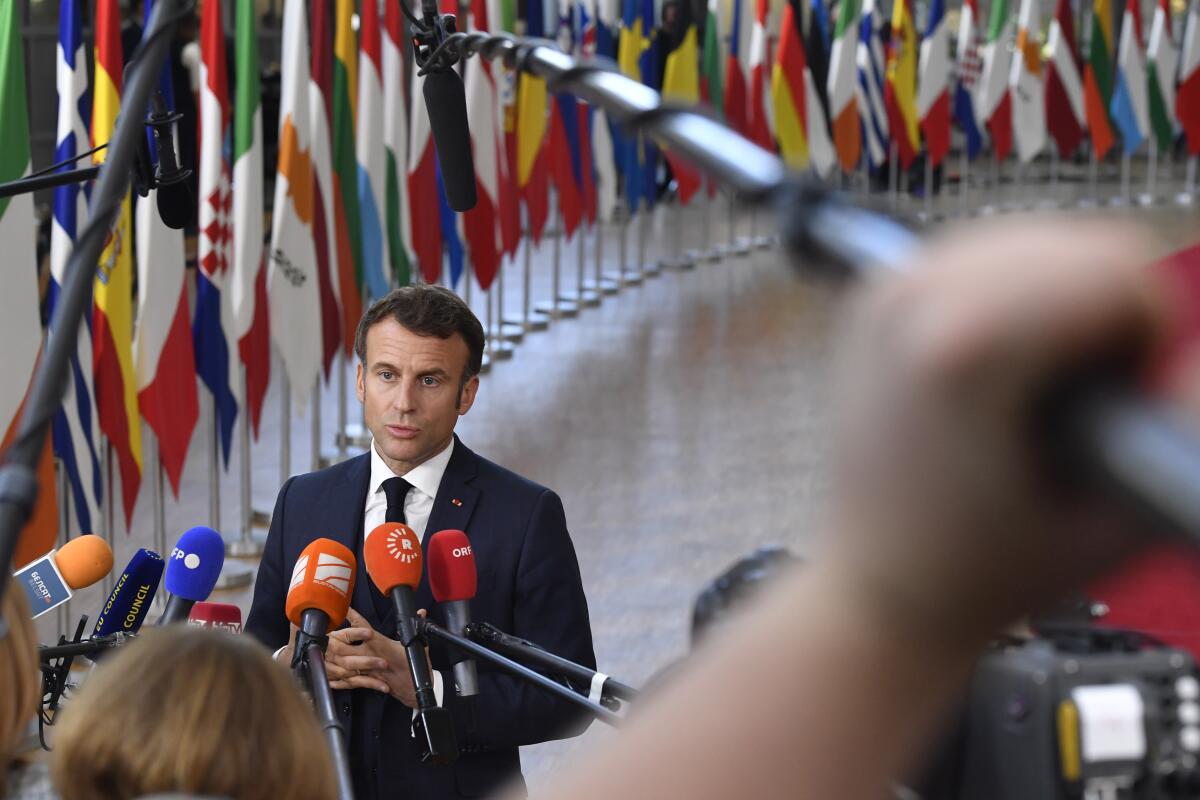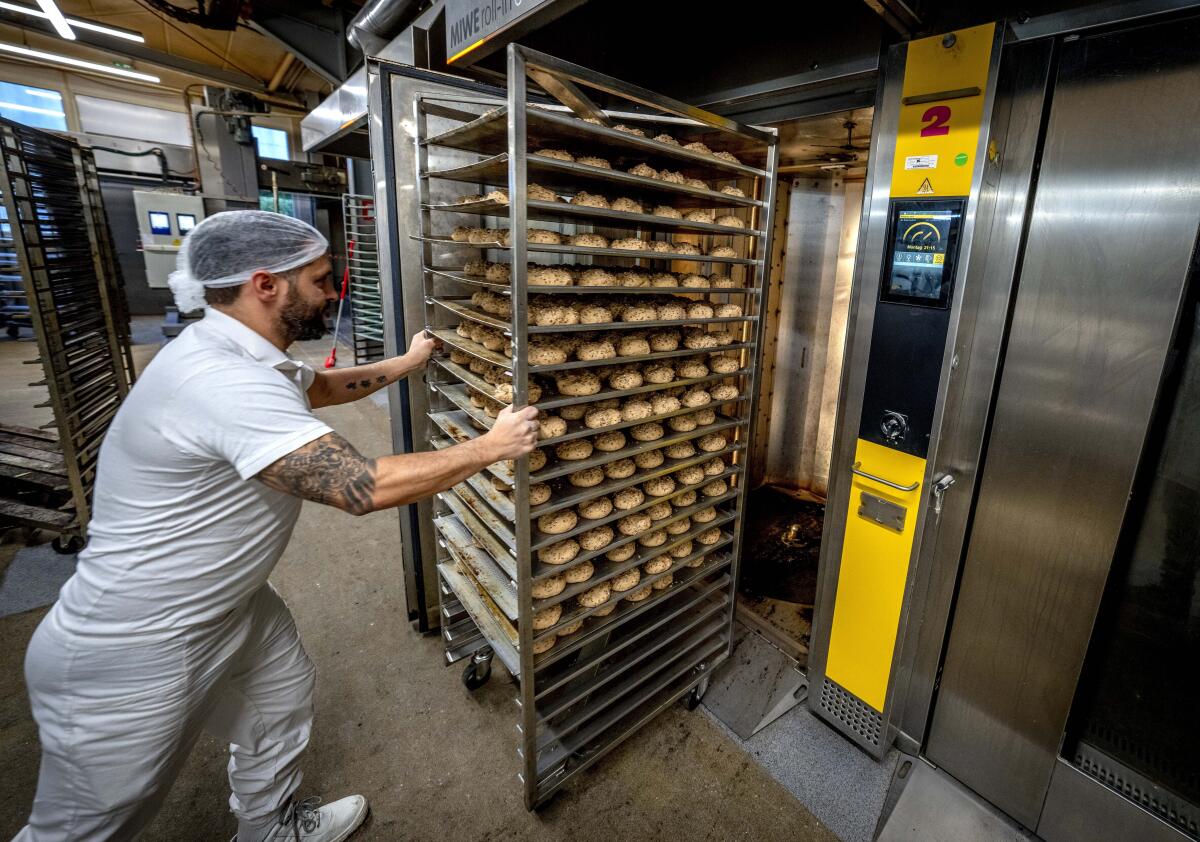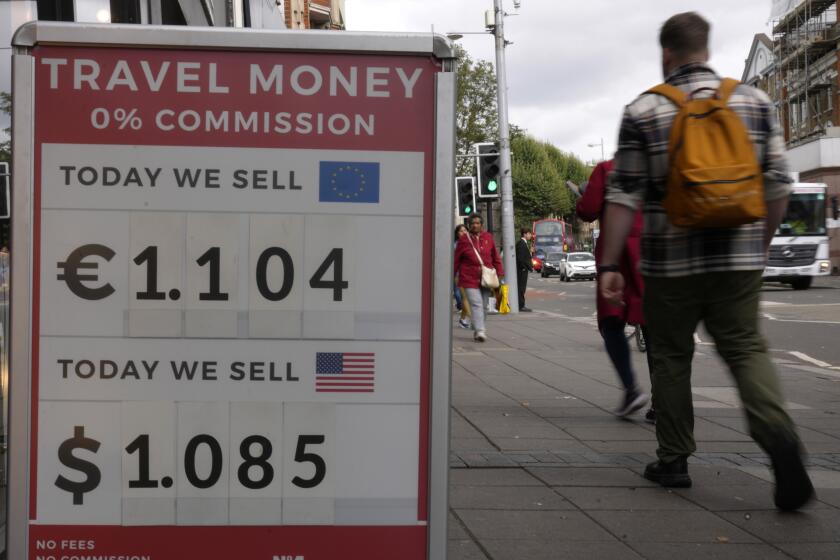Turtlenecks, shared showers and wetsuits for indoor pools: Europe grapples with energy crisis

- Share via
MONTEROSSO AL MARE, Italy — For years, Antonio Scognamillo paid $1,200 a month to power La Smorfia, his cozy pizzeria offering dozens of styles of pies in this hilly, medieval tourist enclave by the Ligurian Sea.
That was before energy and food costs soared in the wake of the Russian invasion of Ukraine, threatening the future of his long-profitable business. Today, Scognamillo stares down at a $5,200 monthly power bill — on top of 40% increase in costs for mozzarella, grain and flour in a country where inflation is now at a 40-year high.
A stumbling British pound and surging U.S. dollar have left Brits feeling glum and plenty of Americans feeling gleeful.
And it could soon get even worse. On Saturday, Russia said that it would pull out of a United Nations-brokered deal to allow grain exports from Ukraine, adding another layer to the toll of war that’s reached across the globe.
“It’s 50,000 [euros] I didn’t make this year,” Scognamillo, 45, recently said with exasperation in his Cinque Terre region shop where the toppings offered include prawns, prosciutto and Genoese pesto. “Everything is more expensive. But my salary is the same.”
Since Russia, long Europe’s biggest natural gas supplier, cut off much of the continent last spring in retaliation for supporting Ukraine, energy costs from London to Warsaw have soared to unprecedented levels.

Over the summer, countries scrambled to fill reserves by upping flows from Norway and importing tanks of liquefied natural gas from North America and Africa. That and an unusually toasty autumn offered some sense of reprieve, with radiators largely unneeded and power prices recently dipping on trading markets.
Yet for small businesses and families, savings have failed to trickle down — and may never as an energy-hungry Europe barrels toward a dark, long winter and governments warn of shortages for years to come.
“We’ve never seen anything like this,” said Graham Weale, a professor of energy economics at Ruhr University Bochum in Germany who formerly worked as the chief economist for RWE, one of Europe’s largest energy companies. “We’re in new territory. Energy, which was a basic good, is now becoming a luxury good.”
The crisis is stoking worrisome divisions over support for Ukraine as the Russian invasion drags on and Europeans far from the front lines feel the effects on their wallets and in their chilly living rooms.
In Prague, 70,000 demonstrators recently marched under the banner “Czech Republic First.” A coalition of far-right groups, they demanded that their government stop arming Ukraine and sign a new deal with Russia over gas, and that the center-right prime minister, Petr Fiala, resign.
“The best for Ukrainians and two jumpers for us,” read one of the placards, a reference to Czechs expecting to wear extra layers of clothing to stay warm.
Surging inflation and fears about an energy crisis from Russia’s ongoing war in Ukraine are taking a toll on the finances — and psyches — of Germans.
European nations that have traditionally worked closely on trade are now coming head-to-head. Germany, the European Union’s biggest economy, faces criticism for passing a $199-billion subsidy program to help its citizens while being reluctant to join France and other EU members in signing what would be the bloc’s first price cap on natural gas.
Claudia Kemfert, an energy economist at the German Institute of Economic Research, described grumbling on the streets and in political meetings as part of a broader trend in how “energy is used as a tool of geopolitical war.”
“This is the worst crisis we’ve had since World War II,” she said, speaking of energy struggles. “We are doing a few things quite well like standing together against Russia and preparing to get fossil energy in the short-term from other nations. But we can do so much more. Our dependence on too few kinds of energy is too high.”
On a continent where per capita energy use is among the world’s highest — while still half that of the U.S. — governments and residents have reacted in ways that are cosmetic, unusual and, in some cases, extreme.
In Switzerland, the environmental minister faced a backlash recently when she suggested people shower together to save energy. The minister, Simonetta Sommaruga, later backtracked, saying that “after a certain age, showering together is no longer suitable for everyone.”
Toward a more sustainable California
Get Boiling Point, our newsletter exploring climate change, energy and the environment, and become part of the conversation — and the solution.
You may occasionally receive promotional content from the Los Angeles Times.
In Paris, top government officials have taken to showing up at public events in puffy jackets and turtlenecks, the latter being the sartorial choice of President Emmanuel Macron. Federal buildings now ban hot water in bathroom faucets. The Eiffel Tower, usually lighted until 1 a.m., has started to turn off the switch early. Many building managers in Paris, who typically turn on radiators Oct. 1, pushed the date back by two weeks before delaying it again to Nov. 1.
Across France, public indoor and outdoor pools — typically kept between 80 and 89 degrees — have unplugged their heaters and instituted mandatory wetsuit policies. Some have shut down altogether, said Aldric Singher, director of aquatic equipment for the Greater Marseille Metropolitan Area.
He described the energy crisis as “violent” in a nation where a network of 4,500 aging public pools around the country are increasingly viewed as drains. “I hate to say it, but pools are energy pits,” he said.
Given the uncertain supply, companies and consumers have taken to creative workarounds. In Italy, Europe’s biggest textile maker, some factories have had work outsourced to suppliers in Turkey, which still receives Russian gas.
Older technology is also making a comeback.

Last year, Sara Stenhouse and her husband bought a fuel-heated house in the village of Pertuis near France’s southern coast. After Russia launched the war in late February, the couple decided to switch to slow-burning compressed wood logs, investing more than $24,000 in a new system. But logs were also in short supply because the wood came from Russia, Belarus and Ukraine.
Stenhouse said the pair was quoted $3,150 for the four and a half tons needed for the winter. That was more than twice the usual rate.
In an interview, Stenhouse, 51, said she was “very lucky in finding a source of wood” and would use it to heat her home to 66 degrees Fahrenheit. But many others have been unable to secure the material or afford it.
“We need at least 20 more wood factories working in France to keep up with the high demand,” said Marc Boudouard, the salesman in the town of Oraison who supplied Stenhouse.
Near Munich, wood-seller Konrad Kotterl has also seen demand soar.
Kotterl, who has run his German business for a decade, said the price for a firewood pallet — containing 360 pieces — doubled this year to $400. Still, customers have made a rush for them. He’s stopped taking orders for the rest of the year.
“The cost of heating with wood is expensive,” said Kotterl, 55, who works with a Croatian supplier. “But people are worried there will be no gas.”
While factories, small businesses and poorer households are feeling the brunt of pains, even the better-off are facing a new reality.
Moniza Masud, an account executive at Pinterest who moved from the San Francisco Bay Area to London last year with her husband, a business developer for Amazon, said she used to “never really think too much about the energy.”
Start your day right
Sign up for Essential California for the L.A. Times biggest news, features and recommendations in your inbox six days a week.
You may occasionally receive promotional content from the Los Angeles Times.
That was until the couple’s monthly power bills for a small two-bedroom apartment in central London doubled to $375. Now, Masud wears thick socks and bundles up in extra layers at home while turning the heat off for all but a small part of the day when she warms up her newborn’s nursery.
“We come from professional backgrounds, we’ve been blessed. We never had to think about things like turning off the lights, even though as an immigrant my mom would make sure I never let the water run,” said Masud, 32.
Masud said she now “looks for the little things,” like shutting off her Peloton bike when it’s not in use, switching off wall outlets and “only filling up my tea kettle for the exact amount of water I need.”
The family recently replaced halogen bulbs around the home with more energy-efficient LED ones.
“We’ve always cared about the environment but we’ve never really been paying such close attention, looking penny by penny at things, until now that the prices have gone up and up.” said Masud. “With what’s happening in Ukraine, it just feels like a totally different world — not just with what you see on the news but what you see at home.”
Times staff writer Kaleem reported from London and Paris and special correspondent Johnson from Marseille and Monterosso al Mare.
More to Read
Sign up for Essential California
The most important California stories and recommendations in your inbox every morning.
You may occasionally receive promotional content from the Los Angeles Times.













